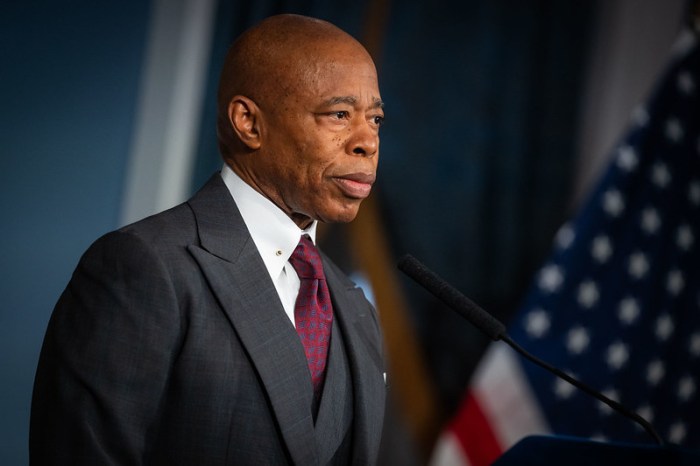BY PAUL SCHINDLER | With New York’s April 19 primary the next big thing, pundits seem most taken by the questions raised by Ted Cruz’s commanding victory over Donald Trump in Wisconsin this week. Have Trump’s many self-inflicted wounds finally caught up with him or will the Texas senator’s momentum hit a brick wall in urbanized eastern states disinclined to embrace his harshly conservative views on social issues?
Manhattanites are no less mesmerized than other Americans by the unfolding Republican train wreck, but their interest is as spectators not participants. In 2012, the borough gave nearly 84 percent of its vote to President Barack Obama against a Republican nominee who fell squarely within that party’s mainstream. Cruz, an obstructionist uniformly hostile to progressive political ideas, and Trump, a megalomaniac unmoored to any overriding policy convictions, but willing to go ugly to stir the crowd, have nothing to sell here.
For voters in Manhattan, the real game is Hillary versus Bernie. After a very rough day on March 15, when the former secretary of state swept five big state primaries, the Vermont senator staged an impressive comeback, winning five caucuses before pulling off his big victory in Wisconsin. Sanders continues to dominate the youth vote, and the flood of small dollar donations continues to surge his way.
Express Ourselves
But even without counting superdelegate commitments, which heavily favor Clinton, she enjoys a lead of some 220 delegates over Sanders, making the math very difficult for the feisty Vermonter. Still, he insists he’s in it to win and, whatever the contest’s ultimate outcome, it will have long-term implications on the Democratic Party’s future in a year when the presidential race increasing looks to be its to lose.
As the man urgently knocking at the Establishment’s door, Sanders bears the greater onus for explaining just how his platform would play out in practice. Unfortunately, despite a vision aimed squarely at the heart of American progressive thinking — a reversal of the nation’s growing income inequality, higher wages, a crackdown on bad behavior on Wall Street, truly universal healthcare, and trade policies that do not erode the living standards of Americans — details have not been Sanders’ strong suit.
One line of criticism leveled at him is how would he achieve his ambitious goals amidst chronic Washington gridlock. But that may be the least of what he has to explain. He is probably correct that if Americans were in fact to elect a 74-year-old socialist, the ripple effect on congressional races would be profound. So let’s put aside questions about his program’s political prospects.
The bigger issue is whether the program can be paid for and work. Sanders is talking about a nearly unprecedented growth in the size of government, but even economists who share his overall goals and some of his specific prescriptions question the optimistic assumptions about economic growth that underlie his proposals. He has not explained how the American economy can sustain a growth rate not seen in many decades.
Sanders is ferocious in his critique of Wall Street giants that walked away from the crash of 2008 relatively unscathed, so it was startling to read his equivocation when the Daily News asked him last week what specific authority he would use in taking on those banks too big to fail or even what specific criminal acts he would have prosecuted among the Wall Street crowd he has regularly labeled criminals.
I have the nagging sense that Sanders’ problem lies in there never having been a meeting in Washington halted because one of the participants said, “Wait, Bernie should really be here.” We can all cynically ask, “Well, what good did all those Washington meetings do us anyway?,” but certainly nobody imagines a world where the meetings simply don’t take place.
Clinton has just about exactly the opposite challenge from Sanders facing her. She is sure-footed in her encyclopedic knowledge of policy detail, but encounters the public’s resistance in trusting that she harnesses that in pursuit of firmly held principles. And many of the most significant trust issues dogging her are easy targets for Sanders.
She has admitted her vote on the Iraq War was a misjudgment, but has been curiously unsuccessful in making the case that four years as secretary of state uniquely qualify her among the five remaining presidential contenders to take on the tragic complexity of the ISIS threat.
She claims to offer a more comprehensive answer than Sanders to potential wrongdoing in the financial markets, yet she undermines her credibility with her failure to provide transparency about the content of her infamously well-paid speeches to Goldman Sachs.
And as she moves to left on issues like the Trans-Pacific Partnership and fracking, she has failed to convincingly explain her new positions as anything other than political expediency.
Hillary Clinton has built a public record of substance and achievement in the face of 25 years of often unhinged opposition from the right wing. But her failure to decisively win over Democratic Party primary voters — especially those too young to have witnessed much of her prelude — now has progressive critics echoing the same sorts of character attacks that have long been mainstays of the Republican hit squad. “Remaking” herself — even if that were possible — is no response to doubts about credibility, but Hillary Clinton will not shake Bernie Sanders unless she can somehow demonstrate that ambition is not the most salient arrow in her quiver.



































